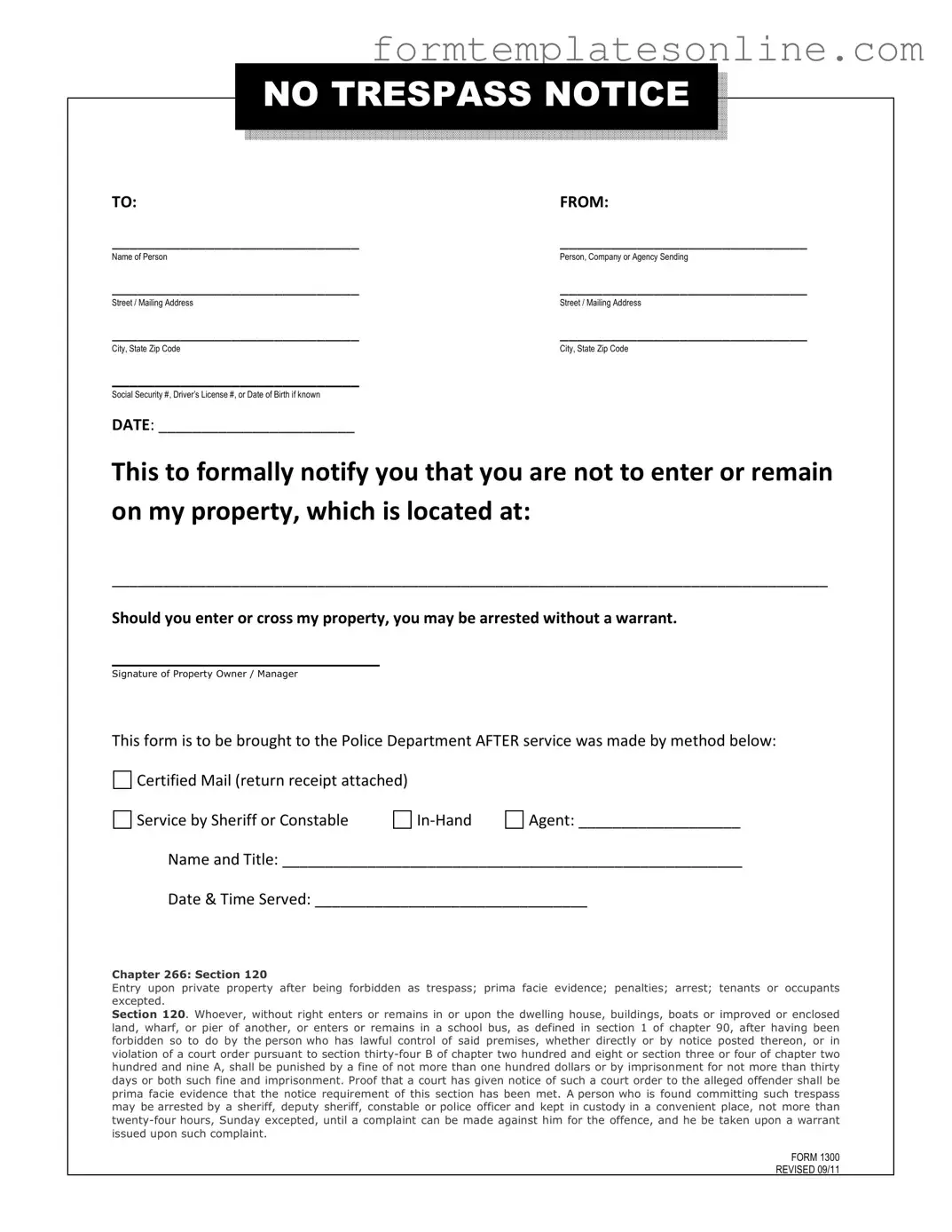No Trespassing Letter PDF Form
When it comes to protecting your property rights, a No Trespassing Letter serves as a vital tool for property owners. This document acts as a formal notice to individuals that they are not permitted to enter or remain on your premises. It is essential to clearly identify both the sender and the recipient, ensuring that all parties understand the seriousness of the message. The letter includes specific details such as the property address and the date of issuance, which adds to its legal weight. By delivering this letter through methods like certified mail or in-person service by a sheriff or constable, you establish a clear record of notification. Should an unauthorized individual disregard this notice, the letter empowers law enforcement to take action, including potential arrest without a warrant. Overall, a No Trespassing Letter not only communicates your wishes but also reinforces your legal standing, making it a critical step in maintaining the security of your property.
Common mistakes
When filling out the No Trespassing Letter form, individuals often make several common mistakes. Here are four of those mistakes:
-
Incomplete Information:
People sometimes forget to fill in all required fields. Missing information, such as the sender's name or property address, can render the form ineffective.
-
Incorrect Recipient Details:
Some individuals mistakenly write the wrong name or address for the recipient. This error can lead to confusion and may prevent the notice from being properly delivered.
-
Failure to Include Date:
Omitting the date is a common oversight. The date is important as it indicates when the notice was issued and can affect legal timelines.
-
Improper Service Method:
People may not follow the specified methods for delivering the notice. Using an unapproved method could invalidate the notice and lead to legal complications.
By being aware of these mistakes, individuals can better ensure that their No Trespassing Letter is completed correctly and serves its intended purpose.
Example - No Trespassing Letter Form

TO: |
|
|
|
|
|
|
|
FROM: |
|
|
|
|
_____________________________ |
|
|
|
_____________________________ |
|
|||||||
!" |
|
|||||||||||
|
|
|
|
|
|
|
||||||
_____________________________ |
|
|
|
_____________________________ |
|
|||||||
##"$"!! |
##"$"!! |
|||||||||||
|
|
|
|
|
|
|
|
|
|
|
|
|
_____________________________ |
|
|
|
_____________________________ |
|
|||||||
"###%"! |
"###%"! |
|
|
|
|
|||||||
|
|
|
|
|
|
|
|
|
|
|
|
|
_____________________________
"$ &"#'"()*"
DATE: _______________________
This to formally notify you that you are not to enter or remain
on my property, which is located at:
____________________________________________________________________________________
Should you enter or cross my property, you may be arrested without a warrant.
This form is to be brought to the Police Department AFTER service was made by method below:
Certified Mail (return receipt attached)
Service by Sheriff or Constable |
Agent: ___________________ |
|
|
|
|
Name and Title: ______________________________________________________
Date & Time Served: ________________________________
! !!
! ! ! !" #$!
! !
%&
'!
( '
! !)!
% !! ! )
More About No Trespassing Letter
What is a No Trespassing Letter?
A No Trespassing Letter is a formal notice that informs an individual they are not allowed to enter or remain on a specific property. This letter serves as a legal warning and can be used to enforce property rights. It is important to clearly specify the property in question to avoid any confusion.
Why should I use a No Trespassing Letter?
Using a No Trespassing Letter helps protect your property rights. It establishes a clear boundary and communicates your expectations to others. If someone ignores the letter and trespasses, you may have grounds for legal action, including contacting law enforcement. This letter can serve as a critical first step in addressing unwanted visitors.
How do I deliver a No Trespassing Letter?
Delivery methods for a No Trespassing Letter include certified mail with a return receipt, service by a sheriff or constable, or in-person delivery. Each method provides a record of delivery, which can be essential if legal action becomes necessary. Ensure that you document the date and time of service for your records.
What happens if someone ignores the No Trespassing Letter?
If someone disregards the No Trespassing Letter and enters your property, you have the right to contact law enforcement. The letter acts as a formal warning, and the individual may be arrested without a warrant for trespassing. It is crucial to take this step seriously to protect your property and ensure your safety.
Can I customize the No Trespassing Letter?
Yes, you can customize the No Trespassing Letter to fit your specific situation. Include the names of the parties involved, a clear description of the property, and any additional instructions or conditions you wish to impose. Personalizing the letter can enhance its effectiveness and clarity.
Is a No Trespassing Letter legally binding?
A No Trespassing Letter is a legally recognized document that can serve as evidence of your intent to restrict access to your property. While it is not a substitute for a court order, it provides a clear indication of your wishes and can support your case if legal action becomes necessary. Always consult with a legal professional if you have concerns about its enforceability.
Key takeaways
Here are some key takeaways regarding the No Trespassing Letter form:
- Complete Information: Ensure all fields are filled out accurately, including your name, address, and the recipient's details. This establishes clear communication.
- Delivery Method: Choose a proper delivery method for serving the notice. Options include certified mail, service by sheriff or constable, or in-hand delivery.
- Legal Implications: Understand that this letter serves as a formal warning. If the recipient trespasses after receiving the letter, legal action may be taken.
- Documentation: Keep a copy of the completed letter and any proof of delivery. This documentation can be vital if further action is necessary.
Form Attributes
| Fact Name | Description |
|---|---|
| Purpose | A No Trespassing Letter serves as a formal notification to individuals that they are prohibited from entering or remaining on a specified property. |
| Legal Authority | The letter is supported by property rights laws, which vary by state. For example, in California, Civil Code Section 1008 provides property owners the right to restrict access. |
| Recipient Information | The form requires the name and address of the individual being notified, ensuring clarity about who is restricted from the property. |
| Property Description | Property details must be included to specify the location that is off-limits, reducing ambiguity in the notification. |
| Consequences | The letter states that unauthorized entry may lead to arrest without a warrant, emphasizing the seriousness of the restriction. |
| Service Methods | Delivery methods include Certified Mail, service by Sheriff or Constable, or in-hand delivery, ensuring the recipient is properly notified. |
| Documentation | After serving the letter, a record of the service must be maintained, including date, time, and the name of the person who delivered it. |
| State-Specific Variations | Each state may have specific requirements or forms for No Trespassing Letters, and it is important to check local laws. |
| Legal Effectiveness | A properly completed No Trespassing Letter can strengthen a property owner's legal position if trespassing issues arise in the future. |
Other PDF Forms
What Documents Do I Need to Sell My Car? - If the odometer reading is incorrect, check the appropriate box and provide an explanation.
Printable Direction of Payment Form - Crucial for body shops to confirm payment without direct input from owners.
In addition to being essential for the registration and titling process, the Georgia Motor Vehicle Bill of Sale form can be conveniently obtained from various sources, including OnlineLawDocs.com, ensuring that sellers and buyers have access to the necessary documentation to facilitate a smooth transaction.
Navpers 1336 3 - Applicants are encouraged to be clear and concise in their requests.
Dos and Don'ts
When filling out the No Trespassing Letter form, it’s important to approach the task with care. Here’s a list of things you should and shouldn’t do to ensure the document is completed correctly and effectively.
- Do clearly identify yourself in the "FROM" section. This establishes your authority over the property.
- Do specify the exact location of your property. Providing a full address helps avoid any confusion.
- Do include the date. This adds a timeline to your notice and is essential for legal purposes.
- Do state the consequences of trespassing clearly. Make it known that legal action may follow if the notice is ignored.
- Do choose a proper method of service, such as Certified Mail or Sheriff service. This ensures that the notice is delivered officially.
- Don't use vague language. Be direct and specific about your intentions to avoid misunderstandings.
- Don't forget to sign the form. An unsigned document may not hold up in court.
- Don't leave out your contact information. This allows the recipient to reach you for any clarifications.
- Don't use informal language. Maintain a professional tone throughout the letter.
By adhering to these guidelines, you can ensure that your No Trespassing Letter is both effective and legally sound.
